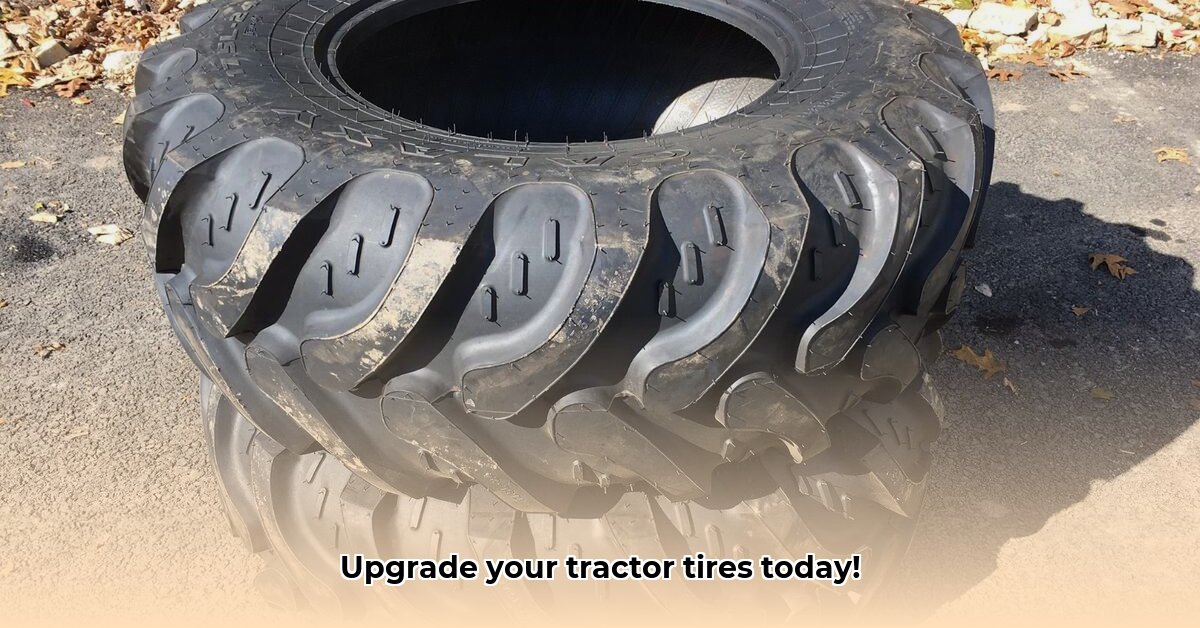
17.5L-24 Tractor Tires: A Comprehensive Buyer's Guide
Choosing the right tires for your tractor is a critical decision impacting operational efficiency, long-term costs, and overall productivity. This guide focuses on 17.5L-24 tractor tires, providing a practical framework for making an informed purchase. We'll explore performance metrics, price considerations, and risk mitigation strategies to help you find the perfect fit for your needs. Isn't maximizing your return on investment a priority? For more detailed information, check out this helpful resource.
Navigating the Price Landscape of 17.5L-24 Tractor Tires
The price of 17.5L-24 tractor tires varies significantly. Why is there such a disparity? Several factors play a crucial role. Brand reputation is one, with established brands often commanding a premium price for their perceived higher quality and technological advancements. The manufacturing process itself also contributes to the price difference; high-tech materials and advanced construction techniques increase production costs. Finally, retailer markups further influence the final price you see. Therefore, don't focus solely on the cheapest option; consider the complete picture of value and performance.
Understanding Performance: The Easy Test Score (ETS) and Its Limitations
The Easy Test Score (ETS) system provides a quick overview of a tire’s performance characteristics. A higher ETS generally indicates superior traction, handling, and overall performance however this system does not paint the entire picture. The ETS doesn't directly measure tire lifespan or maintenance requirements, which are critical factors influencing long-term costs. While the ETS is a useful starting point, consider it alongside more detailed specifications and independent reviews. Before choosing a tire based on its ETS is it important to consider its wear and tear?
A Step-by-Step Guide to Selecting the Right Tires
Choosing the right 17.5L-24 tractor tires involves a systematic approach. Follow these steps:
Define Your Tractor's Workload: What tasks will your tractor perform most frequently? Heavy hauling, light fieldwork, or a mix of applications? Matching tire capabilities to your actual workload is crucial for efficiency and longevity.
Establish a Realistic Budget: 17.5L-24 tractor tires span a wide price range. Setting a clear budget prevents unexpected expenses and narrows your search efficiently.
Leverage the ETS, but Consider Other Factors: Use the ETS as a preliminary comparison tool, but don't rely on it exclusively. Complement it with a thorough examination of detailed specifications and independent reviews.
Consult Independent Reviews: Seek out real-world feedback from farmers and agricultural professionals. Their experiences provide valuable insights into tire durability, performance in diverse conditions, and potential issues.
Analyze Detailed Specifications: Pay close attention to critical specifications like tread depth, tire construction (radial tires are usually preferred for strength and durability), and load capacity. Ensure the tires can handle the maximum weight your tractor will carry.
Consider Brand Reputation: While not a guarantee of quality, well-established brands often provide superior quality control, better customer support, and potentially longer warranties. These benefits usually come at a higher price point.
Evaluate Warranty Coverage: A comprehensive warranty protects against manufacturing defects and provides peace of mind. Carefully compare warranties offered by different brands.
Stakeholder Perspectives: Manufacturers, Users, and Distributors
The 17.5L-24 tire market involves several key stakeholders with different priorities:
Manufacturers: Strive to find a balance between performance and production costs.
End-Users: Prioritize cost-effectiveness, minimal downtime, and reliable performance. A farmer, for instance, needs tires that withstand demanding conditions and keep their operations running smoothly.
Distributors: Aim to meet diverse customer needs profitably.
Understanding these perspectives enables you to interpret market dynamics and make informed decisions.
Risk Mitigation Strategies: Protecting Your Investment
Several risks are associated with purchasing and employing 17.5L-24 tractor tires. These include tire failure, price volatility, and supply chain disruptions. Mitigation strategies include:
Regular Inspections: Conduct routine inspections to detect potential problems early.
Preventative Maintenance: Follow recommended maintenance schedules to extend tire life.
Strategic Sourcing: Consider diversifying your suppliers to minimize reliance on a single source.
Regulatory Considerations: Safety and Environmental Compliance
Stay informed about relevant safety and environmental regulations to ensure compliance and contribute to responsible agricultural practices.
Key Factors at a Glance
Here's a summary of the critical factors to consider when selecting 17.5L-24 tires:
| Feature | Importance | Evaluation Method |
|---|---|---|
| Price | Major factor, but not the sole determinant | Compare across brands and sellers; consider value and quality. |
| ETS Rating | Helpful initial comparison; not definitive | Use with detailed specifications and reviews. |
| Tread Depth | Impacts lifespan and traction | Compare manufacturer specifications. |
| Tire Construction | Influences durability and performance | Understand radial vs. bias-ply differences. |
| Brand Reputation | Suggests quality and support | Research the brand and read independent reviews. |
| Warranty | Protection against defects | Compare warranty terms offered by different brands. |
By carefully evaluating these factors, you can select 17.5L-24 tractor tires that meet your specific requirements, minimizing downtime and maximizing your return on investment. Remember to stay informed about industry advancements and evolving technologies.